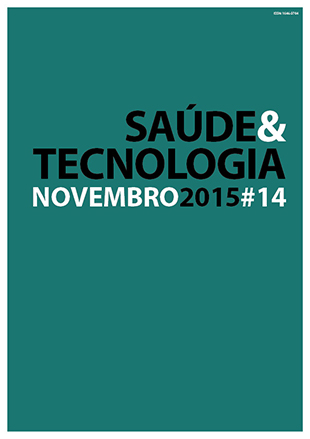Professional situation of prosthetic and orthotics recent graduates in ESTeSL 2004/2005 to 2012/2013: a sociographic portrait
DOI:
https://doi.org/10.25758/set.1274Keywords:
Graduates, Prosthetics and orthotics, ESTeSL, Professional situation, Unemployment rate, Quantitative studyAbstract
Introduction – Nowadays the high unemployment rate and the emigration of the young graduated population is the reason why this population has been insecure about their career and professional future in their home country. In some way, the existence of a reflexive analysis of their actual professional situation could clarify the future for students and recently-graduated in prosthetics and orthotics area. Objectives – Quantifying the professional situation of the graduated population in prosthetics and orthotics on Escola Superior de Tecnologia da Saúde de Lisboa (ESTeSL) and also creating a reflection tool about future professional perspectives. Methodology – Application of a questionnaire through the platform LimeSurvey® to the universe of the prosthetist and orthotics graduates in ESTeSL and characterized by the quantitative data. Results/Discussion – The majority of the graduates are young and females. 78.3% of the inquired are working in the prosthetics and orthotics area and the unemployment rate is 8.7%. It is noticed geographical mobility to the district of Lisbon to study and to work. Conclusion – The unemployment rate for prosthetics and orthotics graduates is lower than the national average. In opposition to other graduated health groups, the National Health System is a minor employer of this population. Noticed desertification of the big urban centers, in what concerns to the first job and actual job.
Downloads
References
Urbano C. A (id)entidade do ensino superior politécnico em Portugal: da Lei de Bases do Sistema Educativo à Declaração de Bolonha [Essence and identity in polytechnic higher education in Portugal: from the basic law on the educational system to the Bologna Declaration]. Sociol Probl Práticas. 2011;(66):95-115. Portuguese
FENPROF. O sistema de ensino superior em Portugal - Parte I. Lisboa: FENPROF; 2012 [cited 2014 Oct 14]. Available from: http://www.fenprof.pt/download/fenprof/sm_doc/mid_132/doc_6444/anexos/sesp_parte_i.pdf
Lei no 46/86, de 14 de outubro.
Lei no 5/1973, de 25 de julho.
Lei no 115/97, de 19 de setembro.
Moreira MC. O paradoxo em tecnologias de saúde da racionalidade paramétrica à racionalidade estratégica [Dissertation]. Lisboa: ISCTE-IUL; 2010. Available from: http://hdl.handle.net/10071/3037
Baganha MI, Ribeiro JS, Pires S. O sector da saúde em Portugal: funcionamento do sistema e caracterização sócio-profissional. Coimbra: Centro de Estudos Sociais da Universidade de Coimbra; 2002 [cited 2014 Oct 14]. Available from: http://www.ces.uc.pt/publicacoes/oficina/ficheiros/182.pdf
Rego A. Ensino superior e a implementação do Processo de Bolonha. TecnoSaúde. 2010 [cited 2014 Nov 28];(ed. esp.). Available from: http://stss.pt/files/section/TECNOSAUDE/edicao-especial-2010.pdf
Decreto-Lei no 384-B/85, de 30 de setembro.
Carvalho MA. Os cursos superiores de tecnologias da saúde em Portugal: análise da construção de uma profissão [Dissertation]. Aveiro: Universidade de Aveiro; 2005. Available from: http://ria.ua.pt/handle/10773/10792
Lei no 49/2005, de 30 de agosto.
Instituto Nacional de Estatística. Classificação portuguesa das profissões 2010. Lisboa: INE; 2011.
Cardoso JL, Varanda M, Madruga P, Escária V, Ferreira VS. Empregabilidade e ensino superior em Portugal: relatório final. Lisboa: Instituto de Ciências Sociais da Universidade de Lisboa; 2012 [cited 2014 Oct 14]. Available from: http://www.ics.ul.pt/publicacoes/workingpapers/wp2012/er2012_1.pdf
Instituto de Emprego e Formação Profissional. Informação mensal do mercado de emprego [Internet]. Lisboa: IEPF; 2013 [cited 2014 Oct 14]. Available from: https://www.iefp.pt/documents/10181/282226/Informação+Mensal+julho+2013.pdf/798bb90c-b122-4e06-8983-4a9fe08a30b2
Lopes S. O desemprego de indivíduos com formação superior: a emigração como uma possível solução [Dissertation]. Porto: Faculdade de Economia da Universidade do Porto; 2013 [cited 2014 Oct 15]. Available from: http://repositorio-aberto.up.pt/bitstream/10216/69835/2/16324.pdf
Nunes F. A mobilidade académica de estudantes e a inserção profissional: o caso dos licenciados em Geografia e Planeamento. In Actas do XII Colóquio Ibérico de Geografia. Porto: Universidade do Porto; 2010. Available from: http://web.letras.up.pt/xiicig/resumos/216.pdf
PROALV. Programa Erasmus - ANPROALV. Agência Nacional PROALV - Programa Aprendizagem ao Longo da Vida; 2014 [cited 2014 Oct 14]. Available from: http://www.proalv.pt/wordpress/erasmus-2/#
Rodrigues AM. Nomadismo no mundo actual: mobilidade de migrantes qualificados e identidades culturais [Dissertation]. Lisboa: Faculdade de Letras da Universidade de Lisboa; 2012 [cited 2014 Oct 13]. Available from: http://repositorio.ul.pt/bitstream/10451/6165/2/ulfl114853_tm.pdf
Tavares D, Fortes CS, Raposo H, Medeiros N, Correia P, Denis T. Inserção profissional dos diplomados pela Escola Superior de Tecnologia da Saúde de Lisboa nos anos lectivos de 2006/07 e 2007/08. Lisboa: ESTeSL; 2012.
Trindade S. Procura de emprego na transição universidade - mercado de trabalho: research paper submitted to the Development Studies Research Seminar Spring 2012 16th April. Lisboa: ISEG/UTL; 2012 [cited 2014 Oct 13]. Available from: https://aquila2.iseg.ulisboa.pt/aquila/getFile.do?method=getFile&fileId=275677
Marques AP. Mercados e estratégias de inserção profissional: licenciados versus empresas da Região Norte. Braga: Universidade do Minho; 2007.
Downloads
Published
Issue
Section
License
Copyright (c) 2022 Saúde e Tecnologia

This work is licensed under a Creative Commons Attribution-NonCommercial-NoDerivatives 4.0 International License.
The journal Saúde & Tecnologia offers immediate free access to its content, following the principle that making scientific knowledge available to the public free of charge provides greater worldwide democratization of knowledge.
The journal Saúde & Tecnologia does not charge authors any submission or article processing charges (APC).
All content is licensed under a Creative Commons CC-BY-NC-ND license. Authors have the right to: reproduce their work in physical or digital form for personal, professional, or teaching use, but not for commercial use (including the sale of the right to access the article); deposit on their website, that of their institution or in a repository an exact copy in electronic format of the article published by Saúde & Tecnologia, provided that reference is made to its publication in Saúde & Tecnologia and its content (including symbols identifying the journal) is not altered; publish in a book of which they are authors or editors the total or partial content of the manuscript, provided that reference is made to its publication in Saúde & Tecnologia.







